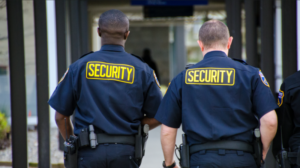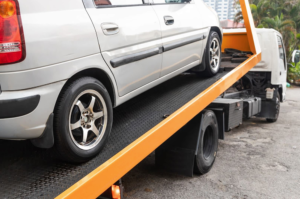Security guards safeguard vital locations, such as banks and schools. However, they also shield individuals, such as celebrities and high-profile clients. Click Our Website to learn more.
Security guards conduct patrols in and around properties, monitoring parking lots, observing entrances, and more. They also help manage and control building access and function as on-site emergency liaisons.

Security guards protect private property or public venues from various threats. They can be tasked with monitoring building entrances, patrolling the grounds of facilities they protect, and providing customer service assistance to guests and employees. They also document incidents, write reports, and collaborate with law enforcement officers to manage or escalate situations as needed.
Security officers often become more visible, as they are the first to respond to suspicious activity. Their prominent positioning in high-traffic areas deters crime and fosters a sense of safety for all in the area. Security guards also conduct routine safety checks to ensure fire exits and emergency equipment work properly.
In some jurisdictions, security guards can be licensed to carry a weapon and detain suspects. They are frequently referred to as security police and can arrest for offenses such as trespassing, loitering, and disorderly behavior. However, the legal authority to do so stems from a contract between the security company and its clients. It does not typically extend to the entire community, as it does for a police officer.
Many former or off-duty police and military personnel find the career of security guard to be rewarding and challenging. These individuals have the training and experience to assess, deter and stop a number of common crimes such as theft, vandalism, physical assault or terrorism.
While guards are trained in a wide variety of emergency response protocols, they also receive ongoing education and participate in drills to stay current on security best practices, laws and regulations that apply to their specific roles. Security officers also have the ability to search (frisk) a person as long as the detainee does not have a weapon or anything that can be used as a weapon.
Security guards who specialize in residential settings often monitor gated communities and apartment complexes. They may help residents conduct neighborhood watch programs and serve as a continual presence to deter crime. Corporate security guards are responsible for managing access to facilities, patrolling grounds and protecting valuable assets. They can also act as an on-site liaison to emergency services and ensure all security policies are followed.
Door Supervisor
While both security officers and door supervisors are vital to keeping businesses safe, they do differ in their responsibilities and skill sets. This difference is important for establishments to understand so that they can choose the right type of security personnel for their location.
Door supervisors are responsible for the entrance of nightclubs, pubs and other licensed premises that are open to the public. They check IDs and monitor patrons who enter the venue to ensure that people are of legal age and to spot any suspicious activity. They can refuse entry to anyone they feel is inappropriate for the site, such as if they’re too intoxicated or are acting unruly. They may also conduct bag searches and other security measures like escorting individuals from the premises when necessary.
As a business owner, you want to choose security staff who can deliver on their responsibilities in a professional and efficient manner. For instance, a door supervisor who is able to defuse conflicts and disputes between patrons will enhance your establishment’s reputation as an inviting, friendly venue. The best door supervisors can maintain composure under pressure and are well trained in conflict resolution techniques.
As you consider hiring security guards or door supervisors for your business, be sure to select SIA (Security Industry Authority) certified personnel. This certification proves that the SIA has approved their training policies, health and safety practices and more. You can also choose to work with a reputable security company that offers a wide range of equipment like radios, protective and high-visibility clothing and more. In addition, they should offer a flexible working schedule and have clear terms and conditions. As you search for the perfect security personnel for your business, look for a company that offers a bespoke service for each client. This ensures that they’re the ideal candidate for your unique security needs and provides a seamless experience from start to finish. It’s also a good idea to choose a company with experienced staff and an excellent customer satisfaction rating. This shows that the company values its employees and customers.
Parking Lot Supervisor
The Parking Lot Supervisor manages and oversees the day-to-day shuttle and parking operations to ensure that staff members provide consistent levels of service to internal and external clients. This position reports to a Transportation and Parking Manager, and it is responsible for hiring, training, scheduling, assigning work, disciplining, and reviewing the performance of all technical/support staff including Transit Services Operators, Van Drivers, and casual relief drivers. It also assists with the recommendation and administration of operational policies, procedures, and processes and provides staff with ongoing training to maintain knowledge and skills. It also helps to maintain accurate records and inventories related to planning, accountability, shuttle operations, ridership, parking meter readings, and the collection of parking fees.
The duties of the Parking Lot Supervisor differ from those of the Senior Parking Lot Attendant. This supervisory position takes on the added responsibility of supervising Parking Lot Supervisors, who have a wider range of responsibilities over off-street parking facilities. Other duties include conducting utilization studies for lots and spaces, preparing data collection forms, deciding on areas for study, and assigning personnel to collect data; determining peak usage times; and reviewing the results of the utilization studies with management.
Other important responsibilities are ensuring parking attendants/cashiers are trained properly, and that tickets are issued when appropriate and in the correct manner. This includes providing on-the-job training, and ensuring that tickets are issued in accordance with established policy. Additionally, a Parking Lot Supervisor must be able to certify inventory reports and make bank deposits. Finally, he or she must be able to actuate parking meters and compare daily reports against meter readings.
It is also the job of the Parking Lot Supervisor to maintain the physical condition and appearance of his or her location. This includes ensuring that the equipment and floor are clean and adhering to sanitation regulations. Finally, a Parking Lot Supervisor must be a positive role model, and set a high standard for customer service while demanding the same from parking lot attendants/cashiers. Parking Lot Supervisors are also expected to smile and acknowledge all customers, greet them, and extend a warm welcome to them as they enter the facility.
Event Security
Event security is a key aspect of any big entertainment event, such as a concert, sports game, or festival. These guards work to ensure that everyone at the venue has a good time without having to worry about their safety. They are able to do this by conducting regular patrols, checking IDs and guest lists at the door, and jumping into action when necessary.
Skilled event security teams also know what to look for in an attendee, such as suspicious body language or group behavior. They can then quickly de-escalate or remove the offending party while maintaining discretion, which is essential for an enjoyable experience for all.
Security officers stationed at the entrance can conduct security sweeps to check bags and belongings before guests are allowed inside the event. This helps to prevent weapons from entering the venue and protects against people who may try to sneak in contraband such as drugs or alcohol. If a person does attempt to enter the venue without an approved ticket, these security personnel can detain them while contacting event organizers for appropriate actions to take.
A security team at a major event is likely to be very busy with lots of things to monitor. It is important that security operatives are trained to perform patrols of the entire venue with a focus on vulnerable areas and security weaknesses. They should also be able to work well under pressure and have the ability to maintain clear lines of communication.
If an incident does occur, it is vital that it is reported and documented. This will enable the security company and client to learn from the event, improve their operations and security protocols, and prevent similar incidents from occurring in the future.
A qualified security guard’s resume should show that they are trained in patrolling a venue, conducting security checks, monitoring images registered on surveillance cameras, identifying trespassers and suspects, reporting suspicious incidents, and performing first aid when needed. Other qualifications include physical fitness, stamina, strong observational skills, and being able to work under pressure. The ability to keep a cool head is also important when dealing with large crowds.

